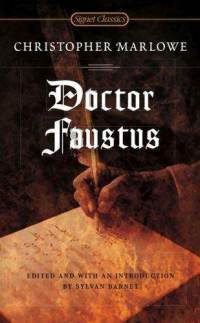Doctor Faustus By Christopher Marlowe Summary and Analysis Scene 1

SCENE 1 FAUSTUS discovered in his study.
FAUSTUS.
Settle thy studies, Faustus, and begin
To sound the depth of that thou wilt profess:
Having commenc'd, be a divine in shew,
Yet level at the end of every art,
And live and die in Aristotle's works.
Sweet Analytics, 'tis thou hast ravish'd me!
Bene disserere est finis logices.
Is, to dispute well, logic's chiefest end?
Affords this art no greater miracle?
Then read no more; thou hast attain'd that end:
A greater subject fitteth Faustus' wit:
Bid Economy farewell, and Galen come,
Seeing, Ubi desinit philosophus, ibi incipit medicus:
Be a physician, Faustus; heap up gold,
And be eterniz'd for some wondrous cure:
Summum bonum medicinae sanitas,
The end of physic is our body's health.
Why, Faustus, hast thou not attain'd that end?
Is not thy common talk found aphorisms?
Are not thy bills hung up as monuments,
Whereby whole cities have escap'd the plague,
And thousand desperate maladies been eas'd?
Yet art thou still but Faustus, and a man.
Couldst thou make men to live eternally,
Or, being dead, raise them to life again,
Then this profession were to be esteem'd.
Physic, farewell! Where is Justinian?
[Reads.]
Si una eademque res legatur duobus, alter rem,
alter valorem rei, &c.
A pretty case of paltry legacies!
[Reads.]
Exhoereditare filium non potest pater, nisi, &c.
Such is the subject of the institute,
And universal body of the law:
This study fits a mercenary drudge,
Who aims at nothing but external trash;
Too servile and illiberal for me.
When all is done, divinity is best:
Jerome's Bible, Faustus; view it well.
[Reads.]
Stipendium peccati mors est.
Ha!
Stipendium, &c.
The reward of sin is death: that's hard.
[Reads.]
Si peccasse negamus, fallimur, et nulla est in nobis veritas;
If we say that we have no sin, we deceive ourselves, and
there's no truth in us. Why, then, belike we must sin, and so
consequently die:
Ay, we must die an everlasting death.
What doctrine call you this, Che sera, sera,
What will be, shall be? Divinity, adieu!
These metaphysics of magicians,
And necromantic books are heavenly;
Lines, circles, scenes, letters, and characters;
Ay, these are those that Faustus most desires.
O, what a world of profit and delight,
Of power, of honour, of omnipotence,
Is promis'd to the studious artizan!
All things that move between the quiet poles
Shall be at my command: emperors and kings
Are but obeyed in their several provinces,
Nor can they raise the wind, or rend the clouds;
But his dominion that exceeds in this,
Stretcheth as far as doth the mind of man;
A sound magician is a mighty god:
Here, Faustus, tire thy brains to gain a deity.
Enter WAGNER.
Wagner, commend me to my dearest friends,
The German Valdes and Cornelius;
Request them earnestly to visit me.
WAGNER.
I will, sir.
[Exit.]
FAUSTUS.
Their conference will be a greater help to me
Than all my labours, plod I ne'er so fast.
Enter GOOD ANGEL and EVIL ANGEL.
GOOD ANGEL.
O, Faustus, lay that damned book aside,
And gaze not on it, lest it tempt thy soul,
And heap God's heavy wrath upon thy head!
Read, read the Scriptures: — that is blasphemy.
EVIL ANGEL.
Go forward, Faustus, in that famous art
Wherein all Nature's treasure is contain'd:
Be thou on earth as Jove is in the sky,
Lord and commander of these elements.
[Exeunt Angels.]
FAUSTUS.
How am I glutted with conceit of this!
Shall I make spirits fetch me what I please,
Resolve me of all ambiguities,
Perform what desperate enterprise I will?
I'll have them fly to India for gold,
Ransack the ocean for orient pearl,
And search all corners of the new-found world
For pleasant fruits and princely delicates;
I'll have them read me strange philosophy,
And tell the secrets of all foreign kings;
I'll have them wall all Germany with brass,
And make swift Rhine circle fair Wertenberg;
I'll have them fill the public schools with silk,
Wherewith the students shall be bravely clad;
I'll levy soldiers with the coin they bring,
And chase the Prince of Parma from our land,
And reign sole king of all the provinces;
Yea, stranger engines for the brunt of war,
Than was the fiery keel at Antwerp's bridge,
I'll make my servile spirits to invent.











